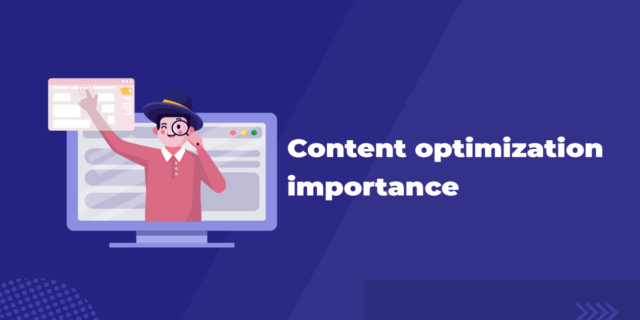In today’s digital landscape, content is king. However, merely producing high-quality content is not enough to guarantee visibility and engagement. Content optimization is essential for ensuring that your content reaches the right audience and achieves its intended goals. This blog explores the significance of content optimization and how it can enhance your online presence, drive traffic, and improve conversions.

1. Enhances Search Engine Visibility
One of the primary reasons for optimizing content is to improve its visibility in search engine results. Search engines like Google use complex algorithms to determine which content to display for specific queries. By optimizing your content with relevant keywords, metadata, and structured data, you can increase its chances of ranking higher in search results. This, in turn, leads to more organic traffic and greater exposure for your brand.
2. Improves User Experience
Content optimization is not just about search engines; it also focuses on providing a better experience for users. Well-optimized content is more readable, engaging, and easy to navigate. Here are some aspects of user experience to consider:
- Clear Formatting: Use headings, subheadings, bullet points, and short paragraphs to break up text and make it more digestible.
- Multimedia Elements: Incorporate images, videos, infographics, and other multimedia elements to enhance engagement and understanding.
- Mobile Responsiveness: Ensure your content is optimized for mobile devices, as an increasing number of users access content on smartphones and tablets.
3. Increases Engagement and Shares
When content is optimized for readability and relevance, it is more likely to engage users. Engaged users are more likely to spend time on your page, share your content on social media, and interact with your brand. This increased engagement signals to search engines that your content is valuable, which can further improve your rankings. Additionally, high-quality content that resonates with your audience can lead to increased shares and backlinks, further amplifying your reach.
4. Boosts Conversion Rates
Optimized content is crucial for driving conversions, whether your goal is to sell products, generate leads, or encourage newsletter sign-ups. By strategically placing calls to action (CTAs) within your content and ensuring they are clear and compelling, you can guide users toward the desired action. Additionally, optimizing landing pages with relevant content, testimonials, and social proof can help build trust and encourage conversions.
5. Supports Effective Keyword Targeting
Keyword research is an integral part of content optimization. By identifying and targeting relevant keywords that align with your audience’s search intent, you can create content that meets their needs. This not only improves your chances of ranking higher in search results but also ensures that your content is relevant to what users are looking for. Using a mix of short-tail and long-tail keywords can help you capture a wider range of search queries and attract diverse audiences.
6. Facilitates Content Repurposing
Content optimization makes it easier to repurpose and update existing content. By optimizing your content for different formats—such as blog posts, videos, infographics, and podcasts—you can reach new audiences and extend the lifespan of your content. Regularly updating and optimizing old content can also improve its relevance and search performance, ensuring that it continues to deliver value over time.
7. Helps in Measuring Success
By implementing content optimization techniques, you can better track and measure the performance of your content. Utilizing analytics tools allows you to monitor key metrics such as organic traffic, bounce rates, time on page, and conversion rates. This data-driven approach enables you to assess the effectiveness of your content strategy and make informed decisions about future content creation and optimization efforts.
8. Builds Brand Authority
Well-optimized content that provides valuable insights and addresses customer pain points can help establish your brand as an authority in your industry. By consistently delivering high-quality, relevant content, you can build trust with your audience and position your brand as a go-to resource for information. This authority can lead to increased customer loyalty, referrals, and long-term success.
Conclusion
Content optimization is a vital aspect of any successful digital marketing strategy. By enhancing search engine visibility, improving user experience, increasing engagement, boosting conversion rates, and establishing brand authority, optimized content can significantly impact your online presence and business growth.


No responses yet